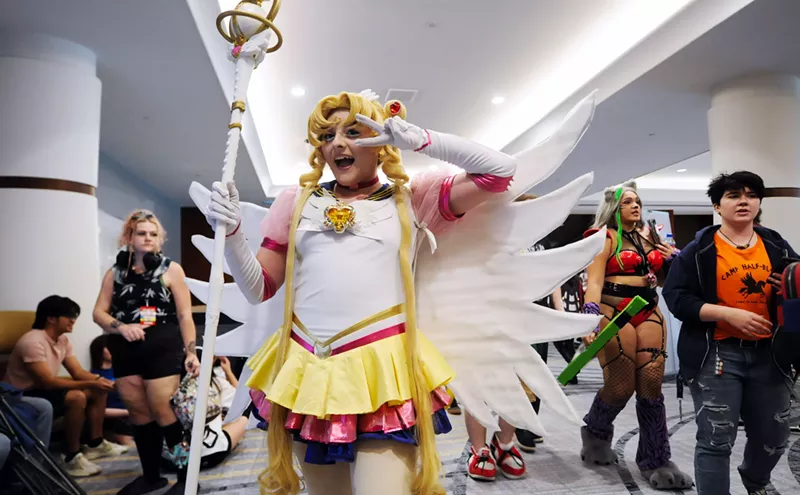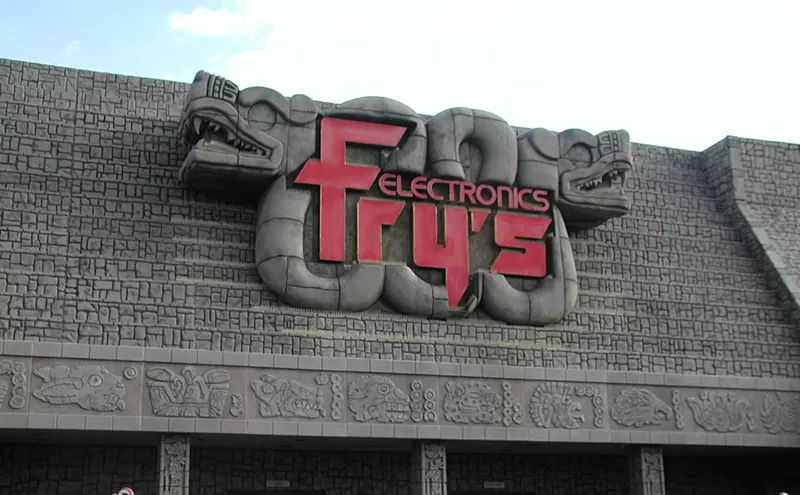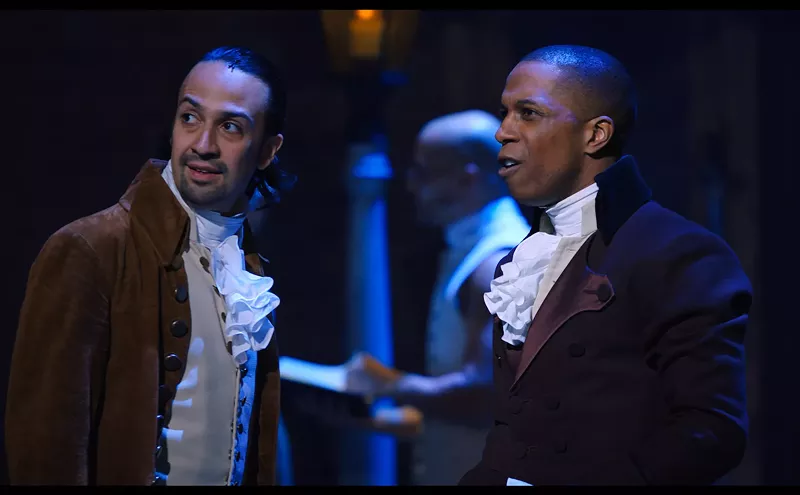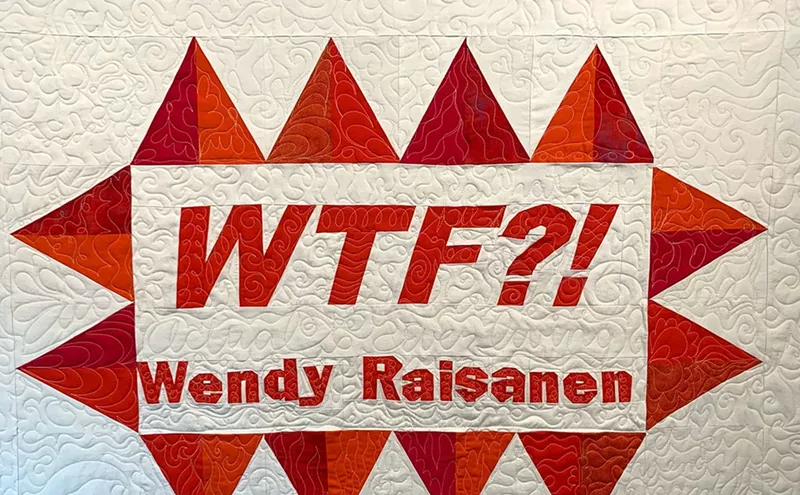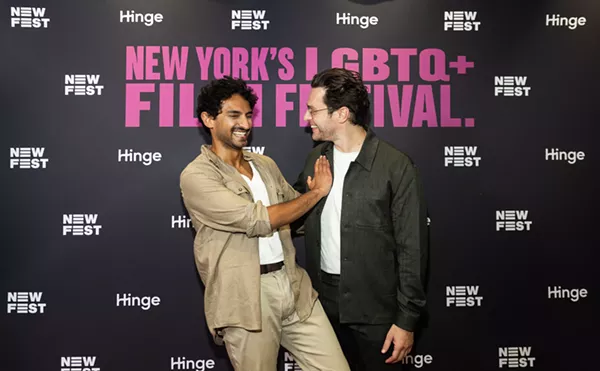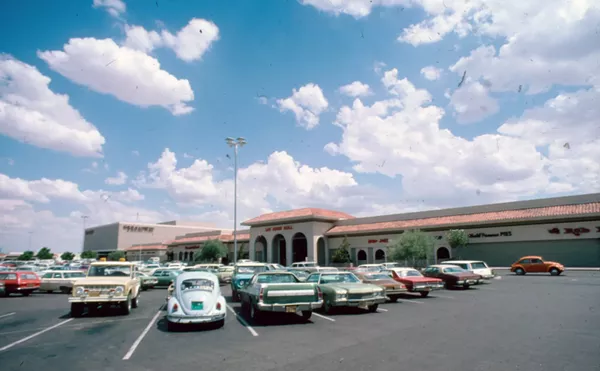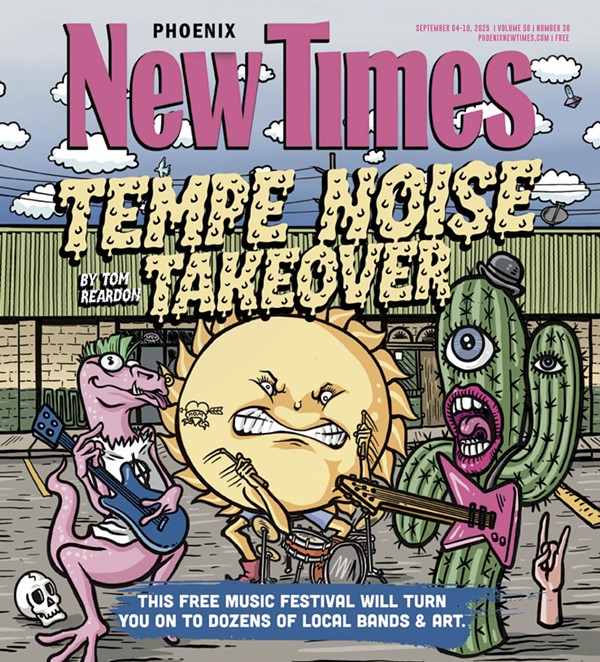Fanshen Cox DiGiovanni wants to talk about race in America -- and she's got an idea of where she wants to start. The writer-actor-director-producer extraordinaire will bring her one-woman show, One Drop of Love, to Mesa Arts Center on Saturday, November 1.
Inspired by her own experiences with race, family, and reconciliation, One Drop of Love endeavors to explore these concepts in a funny, relatable way. In addition to giving two performances, Cox DiGiovanni will be hosting a panel discussion and community dialogue on Thursday, October 31, at the Arizona Opera Center. We spoke with the creative about her performance, her history, and her first-ever visit to Arizona.
See also: The Bad and The Beautiful Fuses Contemporary and Modern Dance at Herberger Theater
Fanshen, you seem to wear a lot of hats. Where did you learn to do all of these things? I mostly see myself as an actor -- that's why I moved to Los Angeles and what I've been pursuing for the longest time in a creative capacity. I've known I wanted to be an actor since I was very young, but at the mean time I had all these other interests. So I joined the Peace Corps in West Africa and that got me into teaching, so I balanced teaching and acting.
As an actor, especially in LA, I started to notice that I wasn't booking but I also was auditioning for things that I didn't feel good about or proud of, so it was hard to bring my all to an audition when I felt like the roles were demeaning or just not me. As much as I think it's good to stretch as an actor, it's also good to know that you've got at least a base that you can work from. So I started to learn about writing.
It helps that I grew up with Matt Damon and Ben Affleck and was incredibly fortunate to watch them take a story that they believed in, then write that story, and write themselves into lead roles in that story, and then turn it into Good Will Hunting. So I had some people close to me to model the fact that I could write characters that I could feel good about and be proud of.
I started learning about writing, did some stand-up, wrote a couple feature-length screenplays, so now I had this writing and some characters I was proud of, but then I asked "what's next, how do I get these characters out there?" and realized I needed to learn how to produce as well. I joined a program in Los Angeles called Project Involve [a faction of Film Independent that works to support filmmakers from backgrounds that are not frequently represented in the film industry] and learned a little more about producing.
My husband was researching MFA schools and found the most affordable one in the country was at California State University Los Angeles, so I followed him into the program. That's where I really learned hands on producing. One Drop of Love was my thesis for the MFA program, so I got to put all the things that I learned together. That's how I ended up producing and performing and writing.
Glad you brought up the elephant in the room: Matt Damon and Ben Affleck are your co-producers for One Drop of Love. How does that even happen? A lot of what the piece speaks to has a lot to do with how we all grew up. I moved to Cambridge when I was 9 and [Damon and Affleck] both had been there longer, but Matt's older brother was my older brother's best friend, and because my older brother had to watch me he would bring me over there. Matt and I were the same age, so we became great friends.
Cambridge is a very progressive town, they care about community and social justice. What was really wonderful is that the school we went to did very collaborative theater productions. They allowed students to make choices about what productions we would do, and even let us choose pieces with guidance from this great teacher, Jerry Speca, so we all had this experience doing theatre together that was community oriented and had color-blind casting and often addressed social justice issues. One Drop of Love explores these same trends.
[Damon and Affleck] have always been very supportive of me and other people who we grew up with who wanted to pursue other careers in the entertainment industry, so when I moved out to L.A. they offered to help however they could. I was still feeling frustrated that I wasn't getting these roles that I wanted so I wrote this part.
Ben found out [about the show] from Facebook or something. I got an e-mail from him saying, "I'm coming to see your thesis performance," and he came and he brought his wife, Jennifer [Garner], and of course the campus was completely abuzz on Twitter about it, but it's completely an exemplar of how loyal they are to their friends and how committed they are to giving back to the community they were raised in. Ben saw it and said he thought these were issues they wanted to talk more about. Matt saw it shortly after and agreed. I know how fortunate I am to have them as counsel in this instance. They are awesome. Not only great artists and talented, but just amazing people, both of them.
When it comes to the American discussion of race, what issues do you think we are focusing too much attention on? Which ones do you think we should be paying more mind to? I hope people walk away from the show [understanding] that we tend to focus too much on our differences when it comes to race. In the show I try to make it clear that race doesn't exist genetically, and yes, we've all kind of come to a place where we believe in it culturally and politically, but genetically there is zero difference, as was proven by Human Genome Project.
In the show, I take the racial categories from the first U.S. Census in the 1790s. It had three racial categories and has been changed 24 times since then, now there are so many racial categories on the census. Anything that can change that easily can't have any real, strong bearing on anything! Unfortunately, we've let it become so important.
I hope people will focus less on what our differences in race are and focus on what we all have in common, which is that none of us want racism. We created race to oppress people, so let's not focus on these differences and instead focus on where we can unify.
What inspired you to write One Drop of Love? What I wanted to do is take my family's personal story and let that reflect how race has been influential in our lives. And, hopefully, let it be kind of a warning tale, like, "This is how strongly we're allowing race to affect us."
The catalyst for my story is that I fell in love with -- and married -- a European. My father is Jamaican and a black American, and my mother is considered white in this country. After my parents divorced I didn't see my father interact with white people. My father was very politically active -- he was into Black Nationalism and Pan-Africanism. I understood his reasoning behind that because he had suffered from many racist events in his life, had been oppressed, as a black man in this country. When I fell in love with a European I was so afraid to tell my dad -- I was afraid it was going to hurt his feelings, I felt like I might be "selling out" my culture. It took a long time to call my dad and invite him to the wedding, and then he didn't come. [The wedding] is the beginning of the play, and we all go on this journey together to find out why he didn't come.
Putting on a one-woman show seems incredibly difficult. What do you do to prepare, what are some of the challenges associated with that? I have to say, it looks like I do all of it and I absolutely don't. I have an amazing projection designer named Heather Fipps. It's a multimedia show, so I use these screen projections with video and audio and animations to let the audience know where we are in space and time, what country is it, what year is it. Heather Fipps designed the multimedia pieces.
I collaborated with other students in developing [One Drop of Love] for my MFA thesis. I don't call myself the director of the piece because I had help in choosing how to represent the characters, do the blocking, all of that. The wonderful part is that I wasn't alone, and of course having those names associated with it [Matt Damon and Ben Affleck] has opened so many doors for the show.
I think the hardest part is that now I am on my own, traveling to these cities, and each city and each new venue has to learn the show, which has a good 85 cues for the technical person. So I come into the theater and generally the day of the show we go through things and the tech person has to learn everything that day. We've had our share of hiccups here and there.
The other part that is pretty hard is trying to spread the word, because even though Matt and Ben are involved as producers, it's difficult to get people to come to theater, period. That piece is a lot of work. I do a lot of social media and twitter and Facebook, so even though I really enjoy it it takes a lot of time. It would be so nice to just focus on the creative aspects, but I also have to let people know who I am and what the show is about.
And even though the subject matter seems really heavy, it's also a very fun and funny show. The minute I say it's about race and social justice, people think it's going to be an hour of guilt and shaming, when really it's just me talking about what I've been through, so they get to laugh and talk about all of the mistakes I've made in my life.
Let's talk about the community dialogue going down on Thursday at the Arizona Opera. We will start with an excerpt from the play so we get a sense of what the play is about, and then we will have a panel with professors from ASU and Tomas Stanton [a poet and a producer with Mesa Arts Center].
One of the other things I do is co-direct an organization called Mixed Roots Stories. Our mission is to strengthen diverse mixed communities through telling stories. We are going to be talking about the different ways you can define what "mixed roots" means, how powerful it is to share personal stories, but also to share the historical context behind all of our personal stories. It's important to have your own individual history, but also to look at society before you came around, and your parents' histories and grandparents' and great-grandparents' and how that impacts who you are today. My co-director at Mixed Roots Stories [Chandra Crudup] is the moderator for that discussion, and she is finishing up her Ph.D in social work this year at ASU.
The panel is free and open to the public. We really hope to foster a comfortable environment. My favorite part of the shows is the Q&A afterwards. Sometimes people come to the mic and say, "my wife dragged me to this show," but then wind up sharing a personal story about what they found in the show. There is immigration in there, there's reconciliation with family, and class, and race, and ultimately everybody winds up connecting in some way. So that really speaks to how important it is that when someone shares their story you feel like you can share your story, too.
Where do you see One Drop of Love heading? [Laughs] I would not say no to Broadway, but I wrote this show with schools and communities and organizations in mind. What writer / actor / producer wouldn't want to be on Broadway?! But Broadway isn't accessible. I wrote [One Drop of Love] to be able to take it to many different places and have it be accessible. I'm having fun going to places where people can afford to go see it, and have these conversations afterwards. The show evolves in each city I go to also -- I'm learning and growing, and I hope to keep learning from the audience that comes to see it.
Have you ever been to Phoenix before? No, I'm so excited! I have a few friends who teach at ASU and tell me about it all the time, so I can't wait to be there.
A community dialogue will take place on Thursday, October 30th from 6-7:30 pm at the Arizona Opera Center. One Drop of Love will have two showings (3 pm and 7:30 pm) on Saturday, November 1st at the Mesa Arts Center.



